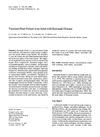Adult Kawasaki's Disease with Myocarditis, Splenomegaly, and Highly Elevated Serum Ferritin Levels
September 2009
in “
Heart & Lung
”
TLDR Kawasaki's disease can occur in adults and should be considered with specific symptoms and high ferritin levels.
A 26-year-old man was diagnosed with adult Kawasaki's disease, presenting with myocarditis, splenomegaly, and highly elevated serum ferritin levels (944-1303 ng/mL). Despite initial treatment with doxycycline, his condition worsened, requiring hospitalization and treatment with intravenous immunoglobulin and acetylsalicylic acid, which improved his symptoms. The case was notable for being the first reported instance of adult Kawasaki's disease with such high ferritin levels and splenomegaly. The study concluded that Kawasaki's disease should be considered in adults with specific symptoms and laboratory findings to allow for rapid differentiation from other conditions and appropriate treatment to prevent long-term complications.



